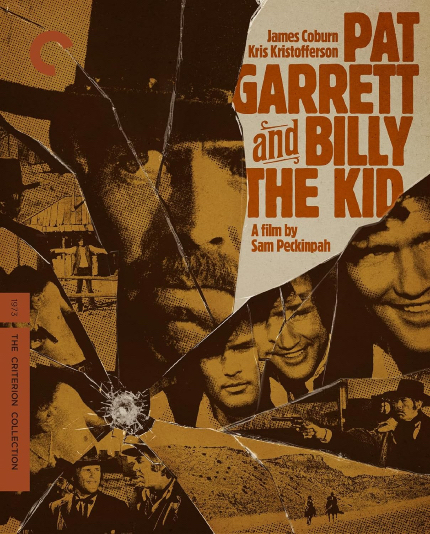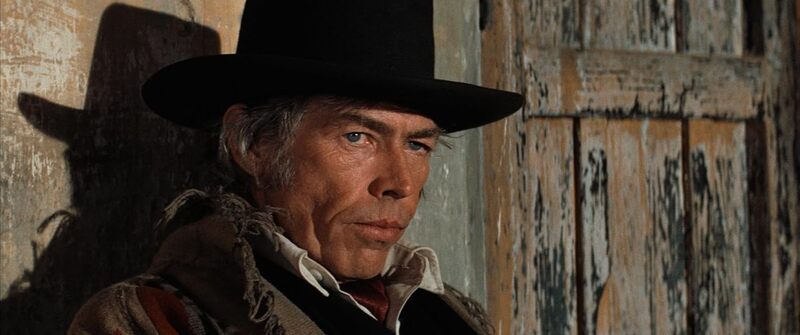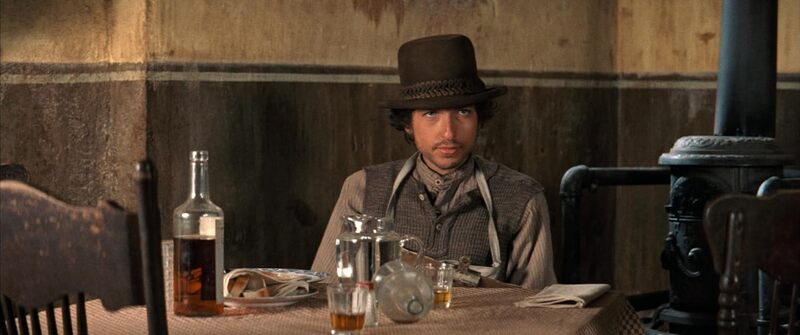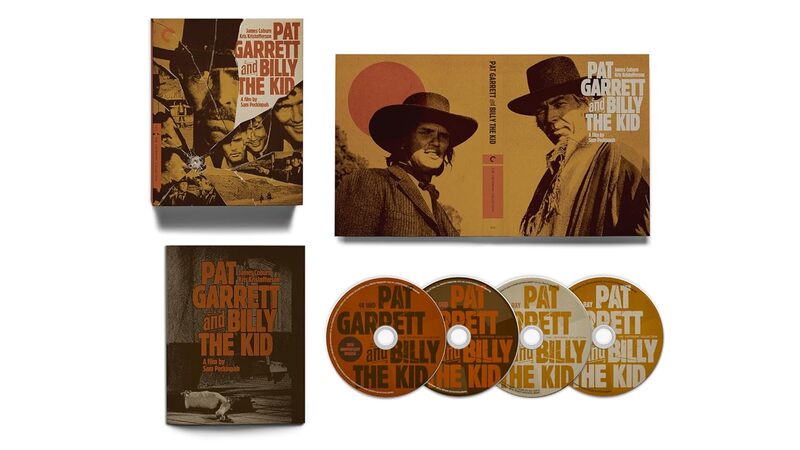PAT GARRETT AND BILLY THE KID 4K UHD Review: Sam Peckinpah Unmasked
Sam Peckinpah’s got James Coburn, Kris Kristofferson, and Bob Dylan’s number in a new edition from the Criterion Collection.

If John Ford’s Western cinema is about the landscape, and Anthony Mann’s is about terrain, then what is Sam Peckinpah’s about? Violence? Explosive blood? Weird bastards? Myopic misogynists? All of that factors, but none win out.
There’s always more to a Peckinpah Western than his trademark pioneering of stylized hyper-violence. Within this corner of his filmography, it wasn’t until the Vietnam War-influenced The Wild Bunch that such deathly rendering took center stage.
Depending on how one defines a “Western,” Peckinpah has up to eight to his name. (Steve McQueen wears a cowboy hat in the contemporary Junior Bonner. Does that count?). If the rural Mexican-set Bring Me the Head of Alfredo Garcia doesn’t count, and it shouldn’t, his fatalistic 1973 revisionist biopic (his only biopic) Pat Garrett and Billy the Kid is his last Western. Fitting.
James Coburn is outlaw-turned-lawman Pat Garrett. Kris Kristofferson is notorious outlaw Billy the Kid. Their dynamic goes well beyond any ignorant white hat/black hat matinee Western cliches. The mere fact of Kristofferson’s baby face and Coburn’s lizard face (at times sneering its way into Lee Van Cleef territory) tells anyone all they rightly need to know about where his own increasingly anarchic storytelling alignment lies.
This is the torrid terrible tale of two liars who tore through life in a hail of gunfire. Billy and Pat’s earthtoned trustiness meets them at the harshest of crossroads. Their bloodlust for one another runs almost as deep as their brotherly love.
The tragedy of it is that old world masculine pride can’t know the latter for the former. By the end, one’ll kill the other. As sure as spurs are clankin’, that’s a given. Looking to history books for Pat Garrett & Billy the Kid spoilers is varying degrees of futile; Peckinpah’s printing a legend all his own, partly truth and partly fiction.
A commentarian on the Criterion Collection’s newly released 4K UHD/Blu-ray edition of the 50th anniversary recut of the film describes the oddly compelling trajectory of the story as that of “a man who doesn’t want to run being pursued by a man who doesn’t want to catch him.” Everywhere they go, they court death. And every death is taken in by witnesses, hardened and solitary. Often these witnesses are women and children. Unfazed, unpulsed hushed witnesses.
The two leads don’t spend much time together, but when they do meet, it reverberates. It has to. Over time, what was once considered strange casting has been long ago vindicated. Coburn later won an Oscar and has since died. Musician/actor/Highwayman Kristofferson’s inherited the mantle of grizzled statesman. As Garrett utters to Billy early on, “It feels like… times have changed.”
Surrounding Coburn and Kristofferson is a who’s who of venerable Western geezers and that-guys. The list includes but is by no means limited to Richard Jaeckel, Jason Robards, Chill Wills, Barry Sullivan, R. G. Armstrong, Luke Askew, Jack Dodson, Jack Elam, Emilio Fernández, Paul Fix, L. Q. Jones, Jack Dodson, Katy Jurado, Dub Taylor, Gene Evans, and Slim Pickens. Some real bona fides in that lot.
Kristofferson, launching what would be a formidable movie career, isn’t the only relative newcomer in the mix. Charles Martin Smith would soon be forever known for playing Terry the Toad in George Lucas’ American Graffiti, but Pat Garrett claims him first. The poor kid barely lasts two minutes in this feel-bad violent shoot ‘em up. It’s all bloody, explosively so. (They don’t call Peckinpah “Bloody Sam” for nothin’).
“The country’s getting old and it’s time to get old with it”, Garrett contentiously tells a cohort as they ride the low country. As they trot off, a godforsaken barbed wire fence comes into focus in the foreground. It’s those self-serving wealthy land barons that insist that Garrett bring them the head of Billy the Kid. (Figuratively, that. Blowing a hole through his forever frenemy will do plenty well for them).
It’s a dusty world where kids use the town gallows for a rope swing. When death finds someone at the end of a bullet, it’s loud, sudden, and in slow motion. The slow motion of any blast costs the impact no inertia. And the kids don’t flinch at any of it.
Women don’t fare well, with no place in the narrative besides on-and-done wives and whores. No sooner do they get their men shot out of their lives or their men just shoot their wad than they’re out of the picture. And that’s the level of respect for ‘em that these killers can muster… from in front and from behind the camera. Billy’s tender lovin’ girl Maria, played by singer Rita Coolidge, comes closest to being the exception. Garrett’s got no such gal. Not even his wife.
In most any combination regarding the law, guys tell each other to shove things up their asses. Usually, the click of a pistol’s hammer isn’t far behind. Just before all that, it’s tense silences and dirty looks. Again and again, Kristofferson’s Billy makes the decision to ride off alone but not ride nearly far enough. “Hard times coming down,” he says. Comin’ down like Sunday mornin’.
Bob Dylan, perched near the peak of his enigmatic powers, plays the less enigmatic but enigmatic nonetheless Alias. “Alias what?” “Alias-Anything-You-Please.” Historically, the guy is the chronicler of all this. Here, he’s The One Who Sees Things, who can chuck a mean knife through a guy’s neck and can read a shelf of can labels floor to ceiling.
It’s not always easy to know what Dylan’s doing in this movie besides singing on the soundtrack. Dare I say Peckinpah felt the same way. (Dylan being involved was the producer’s idea, and Peckinpah hated the producer). Still, it’s far better to have him around than not. He’s got a good edge.
Some may disagree, but it’s no less regressive to be buying physical media in 2024 than it was to make Westerns in 1973. It’s all about how one goes about it, and one can go about it a full number of ways. In any case, get ready to pony up for some serious Peckinpah pictorial poetry in a way you’ve not seen before. There’s a lot of reasons to take a shine to Criterion’s handsome package of four shiny discs (two Blu-rays, two 4K UHDs).
No fewer than three different cuts of the film occupy the sets quartet of discs. Why all the variants? It’s a long story, and one worthy of the lurid yarn the film itself spins. When the movie finally hit screens in ‘73, it was in a hackneyed 106-minute version that critics and audiences were quick to pan.
A period of tenuous postproduction followed the tumultuous and disheveled six-month location shoot wherein Peckinpah’s on-set drinking seemingly reached superhuman levels. Over time, however, thanks to the controversial director’s “final cut” eventually making it out, the reputation of Pat Garrett & Billy the Kid grew considerably.
Both Peckinpah’s “Final Preview Cut” (122 minutes) and the new slightly tightened-up 117-minute “50th Anniversary Cut” begin by toggling artfully between a row of bored would-be badasses blasting a lineup of chickens in 1881, and a sepia flash-forward of Garrett’s 1908 death in New Mexico. The whole of the latter footage was part of the bunch of stuff previously ruthlessly excised by the studio. Peckinpah was right, though; it’s worthy material. Mostly. In 1988, only after the filmmaker himself was dead, did his preferred “preview cut” see the light of day.
Here, that version, probably the most authentic of the bunch, merely gets a new 2K digital master with an uncompressed monaural soundtrack on a Blu-ray, sporting a considerably more worn and rugged look than the other two. The new cut and the theatrical cut each have new 4K digital restorations and are on 4K UHDs.
While the preview cut’s “grindhouse-y” transfer undeniably lends itself to the aesthetic, it is a little odd that the typically extremely director-centric Criterion has seen fit to give Peckinpah’s own version the least love. There’s likely a good reason, but still…. As Garrett growls at the of it all through blood, “What you want… and what you get… are two different things.” Or, in the film’s very last words that are courtesy of Peckinpah himself (actually part of a long text scroll that supplants an end credits roll on only his “Final Preview Cut”), “So what else is new?”
The 50th anniversary cut, made up of bits and pieces from both the other cuts, gets a new audio commentary featuring two of the film’s six original credited editors, Paul Seydor and Roger Spottiswoode, and critic Michael Sragow. Seydor and Spottiswoode (who’d gone on to be a successful director in his own right) oversaw the assembly of the new version and discuss many of their choices.
Spottiswoode is almost strangely non-communicative at first, forcing the upbeat Stagow to work noticeably hard to get substantive answers. Spottiswoode thankfully opens up with his thoughts and memories as the track goes on, recalling what a confusing mess it was to arrive at the compromised theatrical edit. There is also much blanket appreciation of the film, including lots of engaging observations, such as, “This whole movie’s a throwback to naturalistic determinism.” That’s one way of putting it.
In Passion & Poetry: Peckinpah’s Last Western, a newly constructed 48-minute piece, longtime Peckinpah documentarian Mike Siegel utilizes archival talking head and audio interviews to cultivate firsthand tales of making of the film. Kristofferson, guitar in tow, talks about how green and unworthy he felt on this inaugural film of his. It’s quite understandable, considering the caliber of Western movie icons that pepper the supporting cast. And what Peckinpah-centric doc be without the requisite tales of his on-set drunken behavior of arbitrary knife throwing and unhinged behavior? We get plenty of ‘em.
Author Clinton Heylin discusses the involvement of Bob Dylan with the film in the 16-minute Dylan in Durango. Heylin focuses on the original music that Dylan (and an array of top flight guests) created for the movie with a side of the musician’s “mythical” presence on the set. According to him, the whole soundtrack album came together in only two days. Even within that quick timeframe, the timeless track “Knockin’ on Heaven’s Door” was a last-minute add-on.
We also get an archival TV interview with actor James Coburn conducted for the belated Z Channel by then-prominent film critic Charles Champlin. Criterion put a disclaimer about the rough video quality of this episode, and understandably so. They claim it’s sourced from the only known recording of the interview, which is probably a VHS tape that’s been in someone’s basement all these years. All that said, it’s a completely worthwhile watch. Coburn is friendly and forthright about Pat Garrett & Billy the Kid, gladly regaling Champlin with his fond memories of the project, particularly the additional material new to audiences in Peckinpah’s then-newly unearthed “Final Preview Cut.”
Author Steve Erickson is honest-to-goodness inspired in his printed essay that comes folded up in the Criterion high-end cardboard packaging. A stated major fan of Pat Garrett & Billy the Kid, it’s fair to say he’s got Peckinpah’s number. About the filmmaker, he says that he “deromanticizes everything he has ever romanticized, then romanticizes the deromanticizing.” In reviewing these things, one’s gotta be careful not to internalize these essays too much, for fear of unintentional echo. But dang, there’s some fine stringing together of words by Erickson.
Thanks to the film’s canny, cagey screenplay by celebrated novelist Rudy Wurlitzer (whose 1984 novel Slow Fade sure seems to be about Peckinpah), there are no outright bad versions of Pat Garrett & Billy the Kid. The only question now is which is closest to “masterpiece” status. The director’s potent imagery comes through as intended to varying degrees in any case.
So… what is the Sam Peckinpah’s Western cinema all about? It’s gotta be Tactility. Tactility, probably. The tactility of the faces of the long line of beatdown varmints and guys with calloused trigger fingers; the tactility of the always-dirt-covered floors, walls, and porches- the humble respites of an Old West that’s terminal but seduces us anyway; the tactility of the inside of staunchly housed splinted male souls long since hollowed out.
Criterion’s official listing of features:
• New 4K digital restoration of the 50th Anniversary Release, supervised by editors Paul Seydor and Roger Spottiswoode, with uncompressed monaural soundtrack
• New 4K digital restoration of the Original Theatrical Release, with uncompressed monaural soundtrack
• Audio commentary for the 50th Anniversary Release featuring Seydor, Spottiswoode, and critic Michael Sragow
• Two 4K UHD discs of the films presented in Dolby Vision HDR and two Blu-rays with the films and special features
• New 2K digital master of director Sam Peckinpah’s Final Preview Cut, with uncompressed monaural soundtrack
• Dylan in Durango, a new interview with author Clinton Heylin about the film’s soundtrack
• Passion & Poetry: Peckinpah’s Last Western, a new documentary by Mike Siegel about the making of the film
• Archival interview with actor James Coburn
• Trailer and TV spots
• English subtitles for the deaf and hard of hearing
• PLUS: An essay by author Steve Erickson
Pat Garrett & Billy the Kid
Director(s)
- Sam Peckinpah
Writer(s)
- Rudy Wurlitzer
Cast
- James Coburn
- Kris Kristofferson
- Richard Jaeckel










